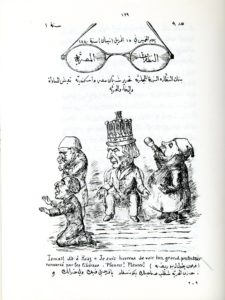Dr. Maha AbdelMegeed (American University of Beirut)
Modern Arabic Language in the Throes of the ‘Urabi Revolt

Front page of the journal Abu Naddara Zar’a (The Man with the Blue Spectacles) 3 (1878), from the archives of the AUB.
The history of the Arabic language is yet to be written. The existing fragments, however, give a prominent position to the long 19th century as the era of language modernization. In this view, language modernization, language democratization, and language simplification are treated as equivalents—if not synonyms. They furnish the arc for the story about the effects that new media technology (like print and telegram), modern science, and nationalism have had on modernizing, democratizing, and simplifying Arabic.
Placing the ‘Urabi revolt (1879-1882) at its center, this project zooms in on the socio-political struggles shaping discourses on as well as practices of Arabic language in the late 19th century. In so doing, it uncovers how the conflicting transformations in this period are underpinned by the struggle over who is allowed to speak. The latter question takes the form of contentions over the definition of speaking (both in its relation to rationality and will, and to the proper form and register of Arabic language in which speaking, rather than “babbling,” could occur). Looked at in this way, the transformations in Arabic are not the seamless results of the emergence of the “new” (technology, science, and nationalism) as much as they are the conflictual traces of social struggle that predicates the specific forms in which the modern is embodied, including modern Arabic language itself.
